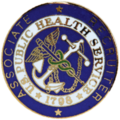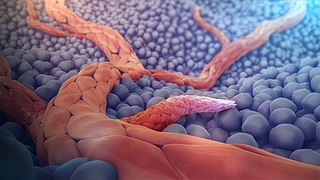
Angiogenesis is the physiological process through which new blood vessels form from pre-existing vessels, formed in the earlier stage of vasculogenesis. Angiogenesis continues the growth of the vasculature mainly by processes of sprouting and splitting, but processes such as coalescent angiogenesis, vessel elongation and vessel cooption also play a role. Vasculogenesis is the embryonic formation of endothelial cells from mesoderm cell precursors, and from neovascularization, although discussions are not always precise. The first vessels in the developing embryo form through vasculogenesis, after which angiogenesis is responsible for most, if not all, blood vessel growth during development and in disease.

Metastasis is a pathogenic agent's spread from an initial or primary site to a different or secondary site within the host's body; the term is typically used when referring to metastasis by a cancerous tumor. The newly pathological sites, then, are metastases (mets). It is generally distinguished from cancer invasion, which is the direct extension and penetration by cancer cells into neighboring tissues.
An angiogenesis inhibitor is a substance that inhibits the growth of new blood vessels (angiogenesis). Some angiogenesis inhibitors are endogenous and a normal part of the body's control and others are obtained exogenously through pharmaceutical drugs or diet.
Moses Judah Folkman was an American biologist and pediatric surgeon best known for his research on tumor angiogenesis, the process by which a tumor attracts blood vessels to nourish itself and sustain its existence. He founded the field of angiogenesis research, which has led to the discovery of a number of therapies based on inhibiting or stimulating neovascularization.

Endostatin is a naturally occurring, 20-kDa C-terminal fragment derived from type XVIII collagen. It is reported to serve as an anti-angiogenic agent, similar to angiostatin and thrombospondin.
Axel Ullrich is a German cancer researcher and has been the director of the molecular biology department at the Max Planck Institute of Biochemistry in Martinsried, Germany since 1988. This department's research has primarily focused on signal transduction. Ullrich has received Hamdan Award for Medical Research Excellence, awarded by Sheikh Hamdan bin Rashid Al Maktoum Award for Medical Sciences, Dubai, United Arab Emirates in 2008 and Ullrich and his team received the Wolf Prize in 2010.

Steven A. Rosenberg is an American cancer researcher and surgeon, chief of Surgery at the National Cancer Institute in Bethesda, Maryland and a Professor of Surgery at the Uniformed Services University of Health Sciences and the George Washington University School of Medicine and Health Sciences. He pioneered the development of immunotherapy that has resulted in the first effective immunotherapies and the development of gene therapy. He is the first researcher to successfully insert foreign genes into humans.
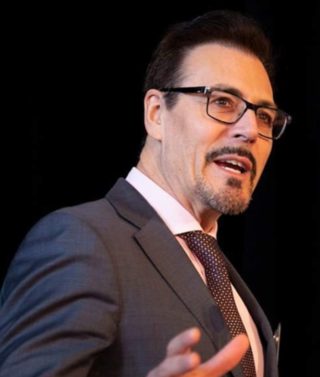
Richard G. Pestell is an Australian American oncologist and endocrinologist who is Distinguished Professor, Translational Medical Research, and the President of the Pennsylvania Cancer and Regenerative Medicine Research Center at the Baruch S. Blumberg Institute. He was previously Executive Vice President of Thomas Jefferson University and Director of the Sidney Kimmel Cancer Center of Thomas Jefferson University. Pestell was appointed an Officer of the Order of Australia in the 2019 Queen's Birthday Honours for distinguished service to medicine and medical education.
Rakesh K. Jain is the Andrew Werk Cook Professor of Tumor Biology at Massachusetts General Hospital in the Harvard Medical School and director of the E.L. Steele Laboratories for Tumor Biology at the Massachusetts General Hospital.
Endothelial progenitor cell is a term that has been applied to multiple different cell types that play roles in the regeneration of the endothelial lining of blood vessels. Outgrowth endothelial cells are an EPC subtype committed to endothelial cell formation. Despite the history and controversy, the EPC in all its forms remains a promising target of regenerative medicine research.
Jessica Kandel is the Mary Campau Ryerson Professor of Surgery and the Vice-Chair for Academic Affairs in the Department of Surgery at the University of Chicago.
Chemoimmunotherapy is chemotherapy combined with immunotherapy. Chemotherapy uses different drugs to kill or slow the growth of cancer cells; immunotherapy uses treatments to stimulate or restore the ability of the immune system to fight cancer. A common chemoimmunotherapy regimen is CHOP combined with rituximab (CHOP-R) for B-cell non-Hodgkin lymphomas.
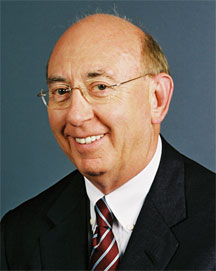
John E. Niederhuber, MD was the 13th director of the National Cancer Institute (NCI), from 2006 until July, 2010, succeeding Andrew von Eschenbach, who went on to become a director at biotechnology firm BioTime. A nationally renowned surgeon and researcher, Dr. Niederhuber has dedicated his four-decade career to the treatment and study of cancer - as a professor, cancer center director, National Cancer Advisory Board chair, external advisor to the NCI, grant reviewer, and laboratory investigator supported by NCI and the National Institutes of Health. He is now Executive Vice President/CEO Inova Translational Medicine Institute and Inova Health System and co-director, Johns Hopkins Clinical Research Network.
Tumor-associated macrophages (TAMs) are a class of immune cells present in high numbers in the microenvironment of solid tumors. They are heavily involved in cancer-related inflammation. Macrophages are known to originate from bone marrow-derived blood monocytes or yolk sac progenitors, but the exact origin of TAMs in human tumors remains to be elucidated. The composition of monocyte-derived macrophages and tissue-resident macrophages in the tumor microenvironment depends on the tumor type, stage, size, and location, thus it has been proposed that TAM identity and heterogeneity is the outcome of interactions between tumor-derived, tissue-specific, and developmental signals.
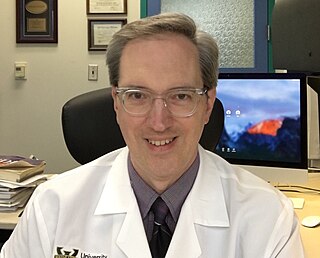
David Henry Gorski is an American surgical oncologist and professor of surgery at Wayne State University School of Medicine. He specializes in breast cancer surgery at the Karmanos Cancer Institute. Gorski is an outspoken skeptic and critic of alternative medicine and the anti-vaccination movement. A prolific blogger, he writes as Orac at Respectful Insolence, and as himself at Science-Based Medicine where he is the managing editor.

The tumor microenvironment (TME) is a complex ecosystem surrounding a tumor, composed of a variety of non-cancerous cells including blood vessels, immune cells, fibroblasts, signaling molecules and the extracellular matrix (ECM). Mutual interaction between cancer cells and the different components of the TME support its growth and invasion in healthy tissues which correlates with tumor resistance to current treatments and poor prognosis. Tumors can influence the microenvironment by releasing extracellular signals, promoting tumor angiogenesis and inducing peripheral immune tolerance, while the immune cells in the microenvironment can affect the growth and evolution of cancerous cells.

Tumor-associated endothelial cells or tumor endothelial cells (TECs) refers to cells lining the tumor-associated blood vessels that control the passage of nutrients into surrounding tumor tissue. Across different cancer types, tumor-associated blood vessels have been discovered to differ significantly from normal blood vessels in morphology, gene expression, and functionality in ways that promote cancer progression. There has been notable interest in developing cancer therapeutics that capitalize on these abnormalities of the tumor-associated endothelium to destroy tumors.
A cancer-associated fibroblast (CAF) is a cell type within the tumor microenvironment that promotes tumorigenic features by initiating the remodelling of the extracellular matrix or by secreting cytokines. CAFs are a complex and abundant cell type within the tumour microenvironment; the number cannot decrease, as they are unable to undergo apoptosis.
The host response to cancer therapy is defined as a physiological response of the non-malignant cells of the body to a specific cancer therapy. The response is therapy-specific, occurring independently of cancer type or stage.



